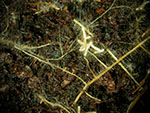Life Sciences News
See our Latest Journal Publications
Scientists benefit from funding initiatives to protect soils and safeguard global food security
 The School of Life Sciences will lead one of four projects, with combined funding of £5 million, supported by a BBSRC led initiative known as SARISA (Soils and Rhizosphere Interactions for Sustainable Agri-ecosystems). SARISA was developed with NERC under the Global Food Security (GFS) programme. Researchers will investigate the factors affecting soil microbial communities and the consequences for crop growth.
The School of Life Sciences will lead one of four projects, with combined funding of £5 million, supported by a BBSRC led initiative known as SARISA (Soils and Rhizosphere Interactions for Sustainable Agri-ecosystems). SARISA was developed with NERC under the Global Food Security (GFS) programme. Researchers will investigate the factors affecting soil microbial communities and the consequences for crop growth.
Soil is fundamental to our life support system, providing food, storing and filtering water, cycling nutrients and providing a habitat for many species. It is at the heart of our interaction with the environment and central to the responsible management of our planet. The world will need to produce 50% more food by 2030 to feed a growing world population and soil science is crucial to meeting this challenge.
Dr Gary Bending’s team will use advanced genetic sequencing methods to derive new understanding of the factors which shape the composition of the rhizosphere microbial community (i.e. its ‘microbiome’), and its consequences for crop growth. Using field crops of oilseed rape as a model system the researchers will determine the roles of soil biodiversity, local climate, soil properties, rotation and geographical distance in shaping the rhizosphere microbiome. Oilseed rape suffers 6-25 % annual losses, termed yield decline, because of the development of a detrimental rhizosphere microbiome, for which there is no treatment. The project will identify shifts in microbial composition and both microbial and plant gene expression associated with a change from a healthy to a diseased rhizosphere. They will use this data to investigate the potential to manipulate recruitment of detrimental and beneficial soil biota into the rhizosphere microbiome in order to promote crop growth and yield. Dr Graham Teakle is a Co-Investigator on the project.
Prof Elizabeth Wellington is the Warwick principal investigator in a second SARISA funded project led by Dr John Hammond at the University of Reading. This study will use a variety of approaches to better understand the role plants and microbes living in the rhizosphere play in making phosphorus available for plant growth and how these roles change during plant development under field and laboratory conditions. Other Life Sciences contributors to the project are Dr Gary Bending, Prof Dave Scanlan and Dr Alex Jones.
Minister for Universities, Science and Cities Greg Clark said
'Forging these strong partnerships between research councils and the three innovative new initiatives announced today are vital in addressing major challenges facing our society like feeding a growing population. By working together, the research councils can bring a range of perspectives to bear on these issues, ensuring that that excellent UK research is translated into tangible economic and societal benefits.'
Professor Melanie Welham, BBSRC Executive Director of Science, said:
'Soil research is an area of strategic importance for BBSRC, NERC and all the Global Food Security programme partners, particularly in relation to the 'sustainable enhancement' of agriculture. These initiatives are great examples of UK public funders working in partnership through GFS to support excellent interdisciplinary research in this area.'
'Good management of land and soils is vital to maintain soil health, nutrient cycling and biodiversity - essential to help provide enough food for a growing global population while protecting ecosystems in the wider environment and the other benefits they provide.'
